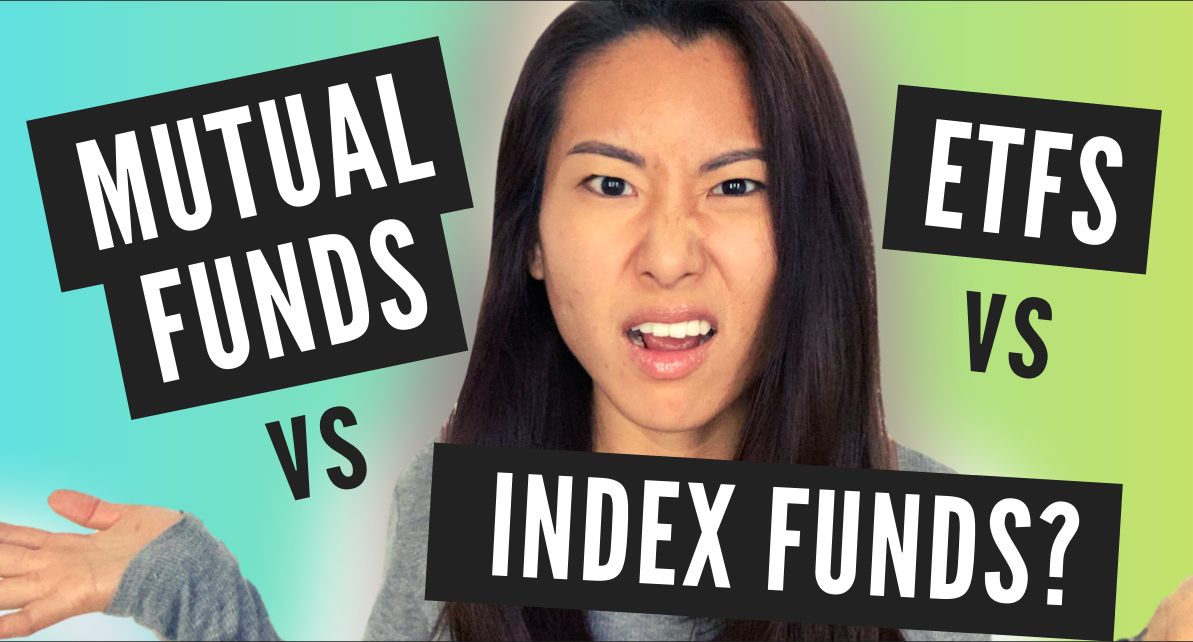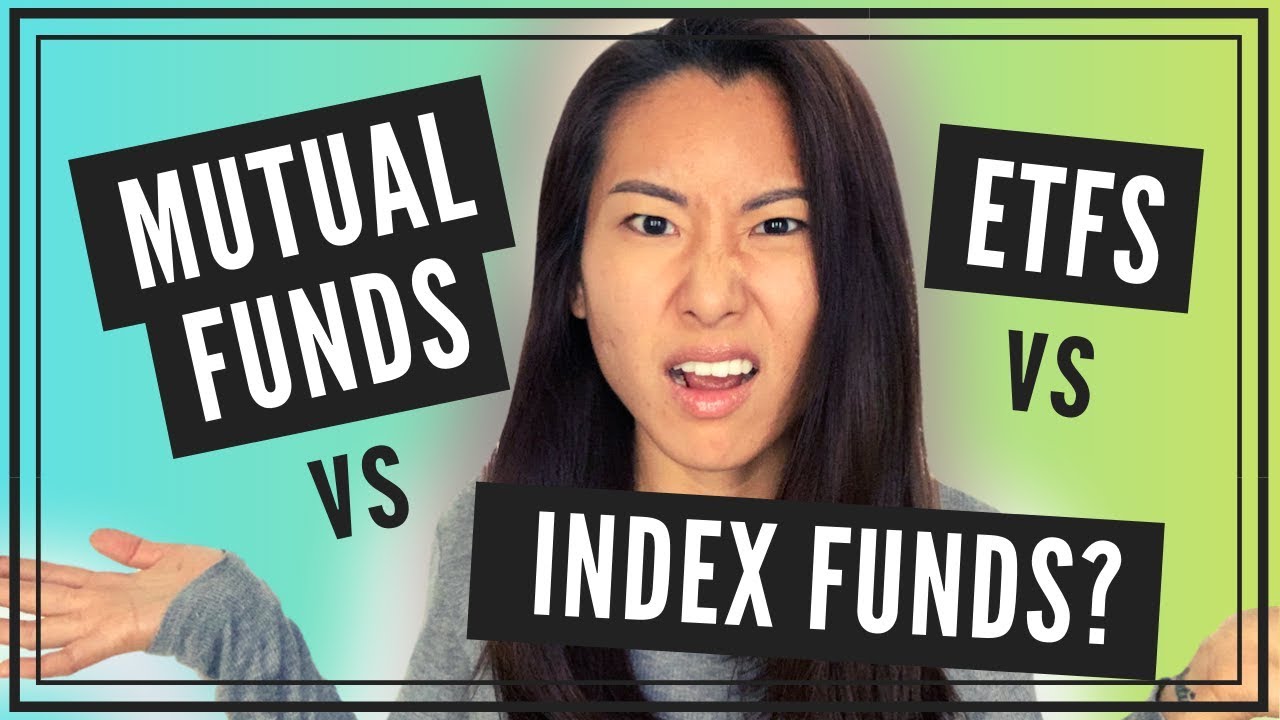What’s the difference between index funds, mutual funds, vs ETFs? For a long time I just sort of assumed they were all the same thing, but they’re actually really different. Index funds, mutual funds, ETFs – each of these are different investment vehicles with its own pros and cons.
We hear these financial terms get thrown around a lot, and I know it can be confusing. I actually have a degree in finance, but I didn’t even learn this stuff in school! I remember investing in ETFs for the first time, only to learn later on that ETFs didn’t have this one really important feature that I wanted in my investment portfolio, so I had to switch over to index funds and it was all kind of a hassle.
I wish I’d known better right from the start, but thanks to that experience, I learned the key differences between index funds, mutual funds, and ETFs. And in this post, I want to share everything I learned with you, so that YOU can be more informed before making any investments of your own.
So if you want to learn the difference between index funds vs mutual funds vs ETFs, and which option might make the most sense for you, then watch the video below or keep reading!
Mutual funds came first
So let’s get right into it. I’m going to start with mutual funds, because mutual funds have been around the longest. They came way before index funds and ETFs, and the earliest known mutual fund was supposedly invented way back in 1800s. Mutual funds were created as a way for a bunch of people to pool their money and make investments together.
Mutual funds offer 3 major benefits:
- The 1st benefit is convenience. By investing in a mutual fund, you get to own a bunch of different stocks, all in one easy package. A mutual fund could have hundreds of different stocks in it, but you only have to make one purchase. In a world without mutual funds, if you wanted to have, say 100 different stocks in your portfolio – you’d have to make 100 separate purchases. Which means you pay trading commissions 100 times, and you’d waste a lot of time sitting in front of the computer clicking the “buy” button 100 times. So inefficient, right? But by investing via a mutual fund, you get instant ownership in all the stocks the mutual fund already owns.
- Owning a lot of stocks at once also gives you diversification, which is the 2nd major benefit of mutual funds. Diversification is a strategy that reduces your investing risk by spreading out your eggs. Instead of having all your money in one stock, which is the equivalent of putting all your eggs in one basket, you spread out your money across many different stocks. That way, if one of the stocks in the mutual fund totally crashes, you’ll still be fine because each stock is only a small portion of your overall portfolio. Mutual funds typically consist of around 90 stocks at a minimum, so they provide a lot of diversification that would be hard to replicate on your own.
- The 3rd benefit of mutual funds is that they’re managed by investment professionals. So rather than try to find stocks on your own, you have some super smart guy who supposedly knows what he’s doing pick them for you.
So mutual funds offer convenience, diversification, and access to professional money managers.
BUT that doesn’t mean mutual funds are 100% amazing. Convenience and diversification are DEFINITELY good benefits, but the problem with having professional fund managers is that they charge a lot of fees. When some really smart, well-educated professional is picking the stocks for your mutual fund, that’s called active management.
In return for managing your money, actively managed mutual funds charge an annual fee of 1-2% of your account balance. So at 2%, if you invested $10k in a mutual fund, $200 goes straight into the fund manager’s pocket. And even if the manager makes poor investment decisions and your account balance goes DOWN next year, you STILL get charged 2%! So you could literally end up with less money than you started with, but the fund manager would still get paid millions of dollars for their “services”.
Even if you find a fund manager who’s done really well for a couple of years, their performance usually doesn’t last over the long run. And the cost of fees can really add up – over the years they can reduce your nest egg by hundreds of thousands of dollars!
So the vast majority of mutual funds are totally not worth the high fees.
Then came the index fund!
One day, a guy named Jack Bogle got so sick of mutual funds ripping people off, that he invented a whole new category of mutual funds called INDEX FUNDS. Index funds totally revolutionized the investing landscape.
Unlike traditional mutual funds, index funds are passively managed. This means that rather than paying an expensive fund manager to actively make buying & selling decisions, the fund follows a fixed formula that totally eliminates the need for active decision making. The formula that it follows is based on an index – and that’s where the name “index fund” comes from.
An index is a representative sample of the stock market, and they were created as a tool to quickly measure stock market performance. Rather than looking up thousands of stocks individually, an index is just one simple thing you can look up. If you’re not sure what a stock market index is, then make sure to check out this post right here for an in-depth explanation.
So Jack Bogle created the first index fund in the 1970s, and it mirrored the S&P 500 index, which is one of the most widely followed indexes in the world. Since the fund simply buys whatever stocks are in the S&P 500, the fees are much much much lower because you’re not paying for expensive fund managers. The Vanguard S&P 500 index fund charges an annual fee of 0.04% …. peanuts!
Index funds are a type of mutual fund. All index funds are mutual funds, but not all mutual funds are index funds.
An index fund will clearly state that it tracks an index, and it will specify WHICH index it tracks.
For example on Vanguard.com, if you look up VFIAX, it says here “Index Fund” in the title, so it’s pretty obvious that this is an index fund:

And if you look at the fund’s prospectus, it specifically states: “The Fund employs an indexing investment approach designed to track the performance of the Standard & Poor‘s 500 Index, a widely recognized benchmark of U.S. stock market performance”.

It doesn’t get any more obvious than that!
But for a mutual fund that is NOT an index fund, the prospectus will state something like this: “advisor independently selects and maintains a portfolio of common stocks for the Fund”

You can also find index funds that track bond indexes, indexes for international stock markets, indexes for stocks in certain industries, etc. etc. etc. – the possibilities are endless. There’s even an index called the FTSE Social Index, which contains only socially responsible companies that meet certain environmental and human rights standards, and Vanguard actually offers an index fund for that.
Moving right along to ETFs – also known as exchange traded funds!
ETFs were introduced about 15 years after the first index fund, and they are very similar to index funds, except for ONE major difference.
With index funds, you can only buy and sell shares once a day. But with ETFs, you can buy and sell your shares whenever the stock market is open. Even though an ETF is not really a stock, you can buy and sell it as if it were a stock. A lot of times you’ll hear the terms “ETFs” and index funds used interchangeably. But they’re not the same thing.
If you wanted to invest in the S&P 500, you could either go with an S&P 500 index fund – like the Vanguard index fund I mentioned earlier, or you can go with an ETF like the SPDR S&P 500 ETF. For you as an investor, it doesn’t make a difference because either way, you’re gonna get exposure to the same 500 stocks in the index.
The question you have to ask yourself is, do I need the 24/7 tradeability of an ETF, or am I good with an index fund? In my experience, being able to trade ETFs really doesn’t help you achieve long-term investing success. The fact that it trades like a stock and you can watch it go up and down on a stock chart only encourages impulsive buying and selling. Human nature has a tendency towards gambling-like behavior, which is obviously the opposite of smart investing, so I personally think ETFs do more harm than good.
So if you’re not sure whether you should go with ETFs or index funds, then I would recommend choosing index funds. They’re essentially the same thing, but you won’t have the added temptation to gamble with your money. Most people will only have to buy once, hold, and sell when they retire, so you really don’t need the 24/7 tradeability of an ETF.
Another huge reason why I like index funds is because they offer automatic reinvestment. This makes it really easy for you to save and invest without even lifting a finger. Index funds allow you to set up a recurring monthly deposit from your checking account, and they’ll automatically buy more shares for you every month.
The best part is that there’s no additional charge for doing this. This free automatic reinvesting feature makes it a NO-BRAINER for you to automate good investing habits!
ETFs do NOT offer this feature. If you wanted to contribute more to your investments every month, you’d have to buy more shares of the ETF every month. This means more work for you, and of course it means you have to pay trading commissions every time, and those can really add up.
So I hope you have a better understanding of mutual funds vs index funds vs ETFs, and what similarities and differences they have.
Mutual funds came first and they offered the benefit of pooled investing. Then index funds came along as a special type of mutual fund with much lower fees. And then finally the ETF came on the scene. It trades like a stock and offers everything that index funds offer except automatic reinvestment.
Always remember to go after your dreams unapologetically, and to live life on your terms – cheers!






